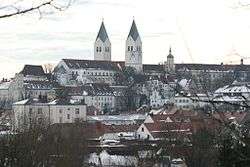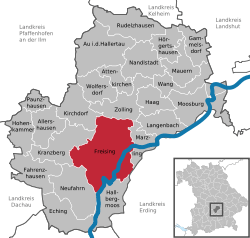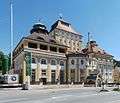Freising
Freising (German pronunciation: [ˈfʁaɪzɪŋ]) is a town in Bavaria, Germany, and the capital of the Freising Landkreis (district), with a population of about 50,000.
Freising | |
|---|---|
 Domberg (cathedral hill) Freising | |
 Coat of arms | |
Location of Freising within Freising district  | |
 Freising  Freising | |
| Coordinates: 48°24′10″N 11°44′56″E | |
| Country | Germany |
| State | Bavaria |
| Admin. region | Oberbayern |
| District | Freising |
| Subdivisions | 29 Stadtteile |
| Government | |
| • Lord Mayor | Tobias Eschenbacher (FSM) |
| Area | |
| • Total | 88.45 km2 (34.15 sq mi) |
| Elevation | 448 m (1,470 ft) |
| Population (2018-12-31)[1] | |
| • Total | 48,634 |
| • Density | 550/km2 (1,400/sq mi) |
| Time zone | CET/CEST (UTC+1/+2) |
| Postal codes | 85354, 85356 |
| Dialling codes | 08161 |
| Vehicle registration | FS |
| Website | www.freising.de |
Location
Freising is the oldest town between Regensburg and Bolzano and located in Upper Bavaria north of Munich, near Munich International Airport, on the Isar river. There are two hills, the cathedral hill with the bishop's castle and Freising cathedral, and Weihenstephan Hill with Weihenstephan Abbey, the oldest working brewery in the world. It was also the first recorded place of a European tornado. The city is 448 meters above sea level.
Cultural significance
Freising is one of the oldest settlements in Bavaria, becoming a major religious centre in the early Middle Ages. It is the centre of an important diocese. Some important historical documents were created between 900 and 1200 in its monastery:
- Freising manuscripts written in Slovenian, being the first Roman-script continuous text in a Slavic language
- Chronicle or history of the two cities by Otto of Freising
The above and other scripts from that time can be found in the "Bayerische Staatsbibliothek" (Bavarian State Library) in Munich.
History
Even though archaeological finds show that the area was settled in the Bronze Age, no proof has been found yet to suggest a continuous settlement until the 8th century AD Frigisinga. Saint Corbinian settled at a shrine that already existed at Freising in 724. He was the forerunner of the diocese of Freising, established after his death by Saint Boniface. According to his Vita by Bishop Arbeo he ordered a bear to carry his luggage over the Alps after it had killed his packhorse. The saddled bear is still the symbol of the city, displayed in the coat of arms. Though the seat of the diocese was moved to Munich in 1821, including the elevation to an arch-diocese, Freising has remained the seat of diocese administration until today.
Between 764-783, Bishop Arbeo founded a library and scriptorium at the abbey. The settlement started to become a religious centre.
The earliest recorded tornado in Europe struck Freising in 788.[2][3]
The mortal remains of Pope Alexander I are said to have been transferred to Freising in 834.
In 996, Freising received city rights from Emperor Otto III. However, after the "(...) destruction of the episcopal bridge, custom houses, mint, and salt works near Oberföhring by Duke Henry the Lion, who transferred the custom houses and bridge site to the upper part of Oberföhring, placing them in the village of Munich on the Isar" (Lins, Catholic Encyclopedia, 1913) in 1158, Freising started to lose its economic significance. In 1159, the romanesque cathedral was constructed (with a notable animal column in the crypt).
In the secularization of 1803, the Roman Catholic Church lost most of its properties and authority over the city.
Education
Schools include:
- Camerloher-Gymnasium Freising
- Dom-Gymnasium Freising
- Josef-Hofmiller-Gymnasium
Universities include:
- Hochschule Weihenstephan-Triesdorf
- TU-München Weihenstephan
See also
Twin towns
Freising is twinned with:






Famous citizens
- Otto of Freising (1112–1158), bishop.
- Mair von Landshut, late 15th-century artist, was a citizen and probably born in Freising.
- The Bavarian General and War Minister Benignus Ritter von Safferling (1825–1895) was born in Freising.
- Georg Eder (1523-1587), jurist and historian
- Martin Ruland the Elder (1532-1602), physician and alchemist
- Johann Stadlmayr (1575-1648), court music director and composer
- Benignus von Safferling (1824-1899), Bavarian General and Minister of War
- Ludwig Prandtl (1875-1953), physicist
- Ernst Kraus (1889-1970), a German geologist
- Karl Maria Demelhuber (1896-1988), SS-Obergruppenführer and General of the Waffen-SS
- Anton Schlüter (d.1999), tractor manufacturer
- Jost Raba (1900–2000), violinist
- Karl Gustav Fellerer (1902-1984), a German musicologist
- Albrecht Obermaier (1912-2004), German naval officer, last deputy naval officer of the Bundesmarine
- Pope Benedict XVI (born 1927), Pope from 2005-2013
- Karl Huber (1928-2009), German painter and sculptor
- Heinrich Reinhardt (born 1947), Roman Catholic priest and professor of philosophy
- Peter Neumair (born 1950), wrestler
- Joseph Weiss (born 1959), German diplomat
- Hans Pflügler (born 1960), footballer, former clubs: Bayern Munich - World champion 1990
- Alexander Kutschera (born 1968), footballer
- Stefan Diez (born 1971), German industrial designer
- Ferdinand Bader (born 1981), ski jumper
- Brigitte Wagner (born 1983), wrestler
- Maximilian Haas (born 1985), footballer
- Maximilian Wittek (born 1995), footballer
- Veit Arnpeck (about 1440), Bavarian chronicler
- Benignus von Safferling (1824-1899), General of the Bavarian Army and War Minister
- Oskar Knight of Niedermayer (1885-1948), officer and adventurer
Points of interest
- Freising cathedral
- Sichtungsgarten Weihenstephan, a notable horticultural garden
.jpg) Freising cathedral
Freising cathedral- Inside the cathedral
 Bishop castle
Bishop castle St. Georg church
St. Georg church Monastery Neustift
Monastery Neustift Asam theater
Asam theater Weihenstephan brewery
Weihenstephan brewery Hofbräuhaus brewery
Hofbräuhaus brewery
References
- "Fortschreibung des Bevölkerungsstandes". Bayerisches Landesamt für Statistik und Datenverarbeitung (in German). July 2019.
- Dr. R. Hennig, Katalog bemerkenswerter Witterungsereignisse. Berlin 1904; Originalquellen: Aventinus (Turmair), Johannes (gest. 1534): Annales Boiorum. Mit Nachtrag. Leipzig 1710; Annales Fuldenses, Chronik des Klosters Fulda. Bei Marquard Freher: Germanicarum rerum scriptores ua Frankfurt aM 1600–1611)
- "Tornadoliste Deutschland". https://tornadoliste.de/788. German meteorological list of documented tornadoes
External links
| Wikimedia Commons has media related to Freising. |

- Official website

- Bavarian state library
- Pictures of Freising